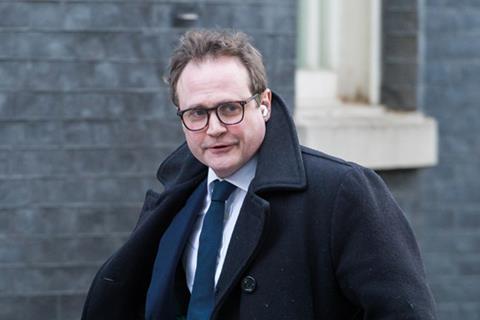A new offence of failure to prevent economic crime is to be rushed through parliament in the coming weeks.

When the Economic Crime and Corporate Transparency Bill came before the House of Lords for its second reading debate on 8 February, Lord Sharpe of Epsom noted that his Home Office colleague Tom Tugendhat (pictured) had told MPs that the government was committed to addressing the need for a new failure-to-prevent offence through the bill.
‘We intend to bring forward amendments to this house in committee,’ the minister added. ‘Of course, I will share those as soon as I can.’ So far, there is no sign of them and the bill is due to begin its committee stage on 27 March. What is going on?

‘We are working in collaboration with prosecutors and other stakeholders to prepare these measures,’ Sharpe said last month. ‘It is vital to get this right so that these reforms can be utilised by law enforcement, do not duplicate what already exists and avoid placing unnecessary burdens on legitimate businesses.’
Who could disagree? But the traditional way of getting it right involves the government explaining its thinking before legislation is drafted and then allowing its proposals to be debated at a bill’s second reading in each house of parliament. Those opportunities have been missed.
Why might a new offence be needed? Although a corporation can be prosecuted, it will generally be liable only for the conduct of a person who had the status and authority to constitute the company’s ‘directing mind and will’. The so-called identification doctrine depends on finding individuals who are senior enough to bind the company with their actions. A prosecution may fail unless it can be shown that the entire board was complicit.
Enter the Law Commission. Although I am a non-executive member of its board, I have no involvement in the advice it gives to government. In November 2020, ministers asked the commission to review the law on corporate criminal liability. Commissioners considered a number of possible reforms to the identification doctrine as well as two existing failure-to-prevent offences, one relating to bribery – criminalised by the Bribery Act 2010 – and the other involving the facilitation of tax evasion, introduced by the Criminal Finances Act 2017.
After publishing a discussion paper in June 2021, the commission suggested a series of options last summer. One of these was an offence of failure to prevent fraud.
Should a company – or, in reality, its owners and investors – be punished for doing nothing? Only if the offence is kept within strict limits. The commission said that an organisation should have a defence if it could show it had reasonable procedures to prevent fraud or that none were needed. And prosecutors would need to prove there was an intention to confer a business advantage on the defendant or its customer. Without that, a company would risk committing an offence if it failed to protect itself from being defrauded.
The commission wanted any failure-to-prevent offence to be considered alongside retention or reform of the identification doctrine. That would be the ‘fullest and most appropriate reform’, Sharpe accepted last month. But it will not happen – at least not yet – because the doctrine is outside the scope of the economic crime bill.
Commissioners also thought that any reform should be ‘limited to a small number of core fraud offences’. However, the former justice secretary Sir Robert Buckland had argued that failure to prevent money laundering and false accounting should also be included – and his proposals attracted widespread support in the Commons.
It seems inevitable that deferred prosecution agreements will be on offer. A company that had not done enough to prevent fraud could then put in place new safeguards, pay a hefty fine and avoid a criminal conviction. Prosecutors would not face the reputational risk of an acquittal.
What, though, if public bodies such as the Serious Fraud Office and the Crown Prosecution Service decline to bring charges, perhaps because the sums involved are too low? Corporates might still be privately prosecuted by victims of fraud.
Anand Doobay, a criminal defence specialist at Boutique Law, told me it was ‘very concerning’ that the government was planning significant changes to the law of corporate criminal liability without first responding to the commission’s proposals and then publishing a draft bill for comment. ‘Instead, there has been no opportunity for any public consideration of the proposed changes and there will be very limited opportunity for parliamentary scrutiny.’ Though the public wanted to hold companies to account for criminal wrongdoing, businesses faced the burden of complying with new legislation.
Inevitably, the devil will be in the detail. Which prosecuting authority will be in the lead? How widely will the new offence be drawn? Will it apply extraterritorially to overseas subsidiaries? We wait to hear.
joshua@rozenberg.net































2 Readers' comments